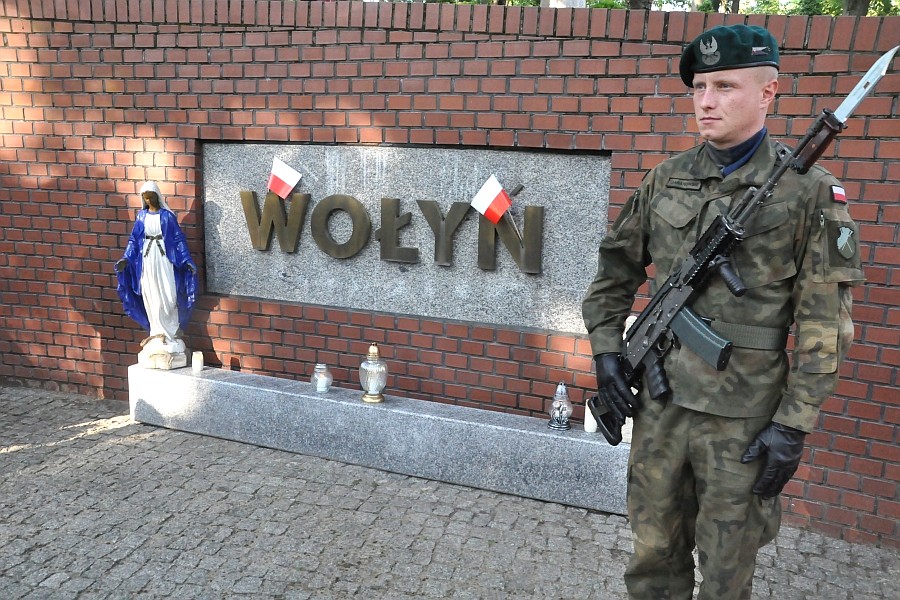Keep our news free from ads and paywalls by making a donation to support our work!

Notes from Poland is run by a small editorial team and is published by an independent, non-profit foundation that is funded through donations from our readers. We cannot do what we do without your support.
Ukraine has criticised plans by Poland to create a new national holiday commemorating Polish victims of massacres carried out during World War Two by Ukrainian nationalists. Kyiv says the idea “flies in the face of the spirit of good neighbourly relations”.
On Wednesday, the Sejm, the more powerful lower house of Poland’s parliament, voted almost unanimously in favour of creating a “Day of Remembrance of Poles – victims of genocide committed by the OUN-UPA in the Eastern Borderlands of the Second Polish Republic” to be held annually on 11 July.
Sejm uchwalił ustawę o ustanowieniu 11 lipca Narodowym Dniem Pamięci o Polakach – Ofiarach Ludobójstwa dokonanego przez OUN i UPA na ziemiach wschodnich II Rzeczypospolitej Polskiej. pic.twitter.com/dVkXqgyKUg
— Sejm RP🇵🇱 (@KancelariaSejmu) June 4, 2025
The bill in question, which was submitted to parliament by the centre-right Polish People’s Party (PSL), part of Prime Minister Donald Tusk’s ruling coalition, notes that the Organisation of Ukrainian Nationalists (OUN) and Ukrainian Insurgent Army (UPA) “murdered over 100,000 Poles” in the years 1939-1946.
They describe the killings as “a crime of genocide against the Polish population”, while also noting that “among the murdered were also representatives of other national minorities, as well as Ukrainians who sided with the victims”.
They chose 11 July for the remembrances because that day in 1943 – known as “Bloody Sunday” in Poland – saw the apogee of killings, with the OUN and UPA attacking Poles in dozens of locations.
A 2016 parliamentary resolution already declared it a day of remembrance, but the new measure – a bill – would make that more formal by creating an official state holiday. In order to become the law, the bill must also be consulted with the upper-house Senate and signed by President Andrzej Duda.
Poland has long regarded the wartime massacres by Ukrainian nationalist groups as a genocide, and parliament has previously recognised them as such.
But Ukraine rejects the use of that term. While it acknowledges the killings of ethnic Poles, it argues that they did not amount to genocide and points to violence and other forms of repression carried out by Poles against Ukrainians.
Meanwhile, OUN and UPA figures are often celebrated as national heroes in Ukraine for their role in fighting for national independence, something strongly condemned by Poland.
In the newly approved bill, the authors argue that the new day of remembrance “will have a positive impact on improving Polish-Ukrainian relations” because “reconciliation and forgiveness cannot be built without truth”.
Exhumations that began last month in Ukraine to find the remains of Poles massacred by Ukrainian nationalists during WWII have so far uncovered skeletal fragments of at least 42 people.
Researchers will now seek to establish the identities of the victims https://t.co/aeAoMt59nP
— Notes from Poland 🇵🇱 (@notesfrompoland) May 7, 2025
However, in a statement issued on Thursday, Ukraine’s foreign ministry contradicted that claim, saying that the proposed day of remembrance of the “so-called ‘genocide’…fl[ies] in the face of the spirit of good neighbourly relations between Ukraine and Poland”.
“Such unilateral steps do not contribute to achieving mutual understanding and reconciliation,” added the ministry, arguing that “academic and unbiased study” through “dialogue, mutual respect and joint work by historians” is the best way to move forward.
Kyiv also pointed to its recent groundbreaking decision to approve the exhumation of Polish victims of wartime massacres in Ukrainian territory, something that it had previously banned.
“Once again, we remind you that Poles should not look for enemies among Ukrainians, and Ukrainians should not look for enemies among Poles. We have a common enemy – Russia,” concluded the statement.
МЗС України про рішення Сейму Польщі щодо "геноциду ОУН і УПА": Такі односторонні кроки не сприяють досягненню взаєморозумінняhttps://t.co/bQmzMJSqjA pic.twitter.com/BLsoqK0d0b
— Цензор.НЕТ ✍️ (@censor_net) June 5, 2025
Recent years have seen moves towards conciliation between Poland and Ukraine regarding the massacres. In 2023, Poland’s then prime minister, Mateusz Morawiecki, said that Ukrainian President Volodymyr Zelensky had pledged that exhumations would take place.
In an important symbolic moment, 2023 also saw Zelensky and his Polish counterpart, Andrzej Duda, jointly commemorate the 80th anniversary of the massacres. The speaker of Ukraine’s parliament “expressed sympathy” towards the victims and their families.
The issue has also assumed broader geopolitical implications, with a deputy Polish prime minister – Władysław Kosiniak-Kamysz, the leader of PSL – last year indicating that Poland would not allow Ukraine to join the European Union until the legacy of the Volhynia massacres is “resolved”.
Poland will not allow Ukraine to join the EU until the issue of the Volhynia massacres in WWII is "resolved", says the Polish deputy PM
The massacres, in which Ukrainian nationalists killed ethnic Poles, have long caused tensions between the two countries https://t.co/cPEArLdvDL
— Notes from Poland 🇵🇱 (@notesfrompoland) July 24, 2024

Notes from Poland is run by a small editorial team and published by an independent, non-profit foundation that is funded through donations from our readers. We cannot do what we do without your support.
Main image credit: SP Słupsk (under CC BY-NC-ND 3.0 PL)

Daniel Tilles is editor-in-chief of Notes from Poland. He has written on Polish affairs for a wide range of publications, including Foreign Policy, POLITICO Europe, EUobserver and Dziennik Gazeta Prawna.



















